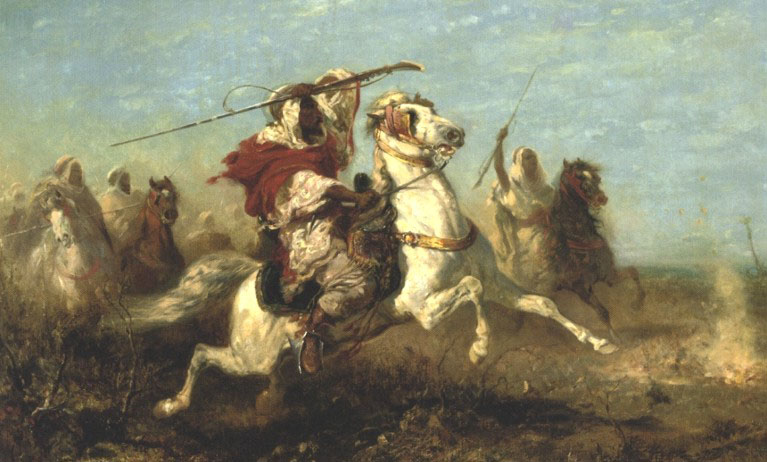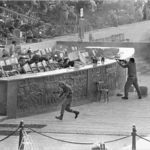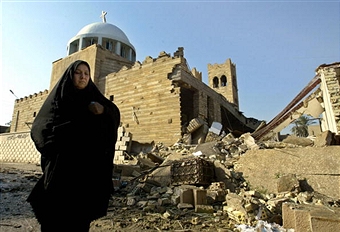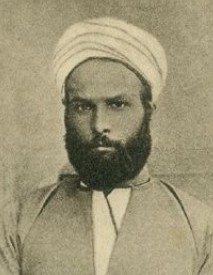
Since the dawn of history men of free intellect and lively conscience have written on the need for peace to prevail over all peoples of the world, and that no man should impinge upon another or any state upon another. But this humanitarian demand will not be achieved until such time as mankind frees itself of all forms of violence.
LIBERAL THINKERS envisage this demand as facing three obstacles: firstly colonial financial institutions, secondly America, thirdly fundamentalism. Contemporary Muslim fundamentalists believe that Islam must rule the world. They base this on the Qur’ān and the Hadith of the Prophet Mohammed and the events of Arab/Islamic history. They adduce as evidence what they find in the traditional annals documenting Arab raids – such as Ibn ‘Abd al-Hakam’s Conquest of Egypt and al-Wāqidī’s Conquest of Syria – to the effect that a people whose lands were raided were faced with three choices: Islam, the Jizya tax or armed combat. This is what the Arabs did to the countries they raided. And what happened in the past repeats itself in the present: the fundamentalists circulate hadith of the Prophet Mohammed such as:
I have been commanded to fight people until they bear witness that there is no God but Allah and that Mohammed is the messenger of Allah;
Paradise lies beneath the shade of swords;
He who dies without having raided or intended to raid has died the death of the pagan;
He who does not embark on a raid or prepare one or bequeath a raider in his family, him shall God afflict with calamity before the Day of Resurrection.[1]
I place my bounty beneath the point of my spear;
My nation will continue to prosper for so long as it wields the sword [2]
Islam is “a religion and a state and a Book and a sword”
These prophetic hadith are coupled with an incitement to disdain labour (particularly agriculture) as can be seen in the hadith of Muhammad which runs:
If you trade on credit or grasp the tails of cattle or content yourselves with farming – thus leaving off from jihad – God will afflict you with humiliation that will last until such time as you return to your religion. [3]
On the basis of these hadith the Arab heritage is replete with glorification of the sword. Shams al-Dīn Ibn al-Jawziyya states:
It is the sword which shores up the argument, confronts the obstinate and provides the blade against the ungrateful [as is recorded in the Qur’ānic Sūrat al-Hadīd, v.25], since while the Islamic religion brought the Book of Guidance, it was the penetrating sword that implemented it. [4]
He goes on to state:
Ever since the Prophet David, no Prophet but Muhammad wielded the sword, for it is he who brought nations low and enforced his laws through fear: either by accepting Islam, or the Jizya tax or the sword. This accords with the Prophet’s words: I achieved victory in little more than a month through the use of terror.[5]
On the basis of this belief in the Arab/Islamic heritage Dr. Ra’ūf Shalabī states in his History of the Muslim Brotherhood:
Muslim Spain, Sicily, the Balkans, South Italy, the Mediterranean islands are all Islamic territories that must be returned to the fold of Islam. The Mediterranean Sea and the Red Sea are Islamic lakes just as they were in the past.
And he goes on to say that Islam “is a religion and a state and a Book and a sword.”[6] In the opinion of ‘Abd al-Qādir ‘Awdah, it is the very nature of Islam that
it should be supreme and never subordinate to another; it should impose its rule over states and expand its dominion over the entire world.
He thus expands on the view of [the founder of the Muslim Brotherhood] Hasan al-Bannā’ who had said that the Islamic faith “directs the Muslims to the finest of colonialisms, and places them as guardians of fallible humankind and grants them the right to hegemony and dominion over the world.” Such a guardianship must be based upon a fundamental pillar – the declaring of all those who differ with the fundamentalists as ‘infidels’, even the Muslim Sufi Ibn ‘Arabī and all those who believe in his philosophy. This exaggeration even embraces the Shāfiʽī scholar Ibn al-Muqrī on the grounds that “he who casts doubt on declaring Ibn ‘Arabī’s school infidels, is himself an infidel”.
The Islamic faith “directs the Muslims to the finest of colonialisms”
There exists in the Arab/Islamic heritage an urge to kill those who differ (on the grounds of disbelief). Such an urge reaches the point of goading on the Muslim entrusted with the task even if he should thereby expose himself to being killed. In the words of Abū Hāmid al-Ghazālī:
If it be permitted to the Muslim to fight the infidel and be killed in the process, this is also permitted to him under the command to ‘enjoin that which is permitted and forbid that which is repudiated.’ It is a good thing that he should expose himself to blows or even death if his actions have an influence upon removing that which is forbidden or breaking the rank of the corrupter, or granting encouragement to those who profess the faith.
However, Ibn Taymiyya was even more clear on this point when he wrote:
All those whom the Prophet’s call to believe in God has reached and who fail to respond to it, are to be killed.

Suggested Reading
In this heritage there is no recognition of mankind on the basis of citizenship, as opposed to that of a mere ‘flock’ in accordance with the hadith of the Prophet which runs:
Each one of you is a shepherd, and each one of you is responsible for his flock. The man is shepherd over his household…
When Abū Muslim al-Khawlānī differed with Muʽāwiya ibn Abī Sufyān, the latter replied:
You are but a hireling whom the Lord of these sheep has employed to look over his flock.
The violence which the fundamentalists employ in our own benighted age is therefore but an extension of Arab/Islamic history. Al-Wāqidī in his work Conquest of Syria notes the following in his section on warfare between the Arabs and the Byzantines:
I was told that not a single Byzantine opposing Abū ‘Ubayda survived that night, and that they were slain to the last man. Whilst they were fighting they were overseen by Darār ibn al-Awz, who was bespattered with blood. Khālid ibn al-Walīd asked him: “What is all this on your back, Darār?” To which he replied: “O King and Commander, I bring you good news that I come to you having slain over this last night 150 men, while my troops have killed countless numbers.” At which Khālid ibn al-Walīd was greatly pleased. And indeed during the night thousands of Byzantines were slaughtered.
He then goes on to say:
When the Arabs reached the Church of Mary, Khālid ibn al-Walīd had been busying himself in killing and taking prisoners. When the two groups (the armies of Khālid and ‘Ubayda) met at the church, the monks were mingling among them while none of the companions of ‘Ubayda unsheathed their swords. When Khālid saw them and noted that none of them had drawn their sword, he was startled and gazed upon them with astonishment. Abū ‘Ubayda turned to Khālid and said: “God has granted that I should conquer the city peacefully, and the believers have fought enough.” But this did not please Khālid who replied: “There is no peace other than God’s peace. How can there be any conclusion of peace with these when you have conquered them with the sword, while the swords of the Muslims are red with their blood, they have taken their children as slaves and they have plundered their wealth?” To which Abū ‘Ubayda responded: “Commander, you should know that I only entered the city after having concluded a peace with them.” At which Khālid replied: “you are still very gullible – I was only able to enter it forcibly, by the sword, and therefore they have no protection. So how could you have concluded a peace with them?” Abū ‘Ubayda replied: “Have fear of God, O Commander!” To which Khālid responded: “how could you have concluded peace with them without my command to do so, since it is under me that you bear your standard and I am your commander? I never retract the sword from these until I have killed the very last of them.”
Al-Wāqidī goes on to relate what subsequently took place: ‘Dissension almost broke out between the ranks of Khālid and Abū ‘Ubayda’. Concerning the Arab attack upon Egypt, al-Wāqidī writes:
The condition of Egypt changed under the Islamic state, most of the villages were destroyed and the revenues from them collapsed… As a result of this the Egyptians suffered considerable hardship.
The Prophet sent the following message to Al-Muqawqas[7]:
To the commander of Egypt: God has sent me as a messenger and has revealed to me a book, a clear recitation (‘Qur’ān’), and has commanded me to issue warnings or exemptions, and to fight the infidel until they profess my faith and the people enter thereto. I call upon you to confirm the oneness of Almighty God. If you do this you shall prosper, and if you refuse you shall suffer. Farewell.
As regards the rule of the Ayyubid state, al-Wāqidī relates that the vizier Salāh al-Dīn burnt down a number of villages and towns before reaching Cairo (‘where fires burned for a total of 54 days’). When Salāh al-Dīn assumed power he seized the palace of the Fatimid state with all its treasuries, finding innumerable wealth there. He legislated for the advancement of the Sunnis and for revenge to be taken against the Shīʽa who were the majority in Egypt at the time. All the magistrates in Egypt were expelled since they were Shīʽites, while the minaret call “Come ye to good deeds”[8] was suppressed.
The violence which the fundamentalists employ is but an extension of Arab/Islamic history
This heritage is reflected in Arab Islamic poetry, where we find al-Zubayr ibn al-‘Awwām[9], one of the 10 preachers of Paradise and attached to the army of Muʽāwiya against ‘Alī ibn Abī Tālib, saying:
I am al-Zubayr al-‘Awwām’s son
Slaughter the Persian lions, every one!
and:
O ye People of Ahnas, oppressor infidels, Satan’s gang, traitors all
Lions of war are upon ye, masters of their folk, over all formations of slender horse
If ye give no response ye shall be humbled, and we shall kill every last dog and braggard!
Al-Fadl ibn al-ʽAbbās imitated him with his words:
O ye People of Ahnas ye oppressor dogs, Lions of war are upon ye, so listen to my tale …
I am Al-Fadl ibn al-ʽAbbās, and I wield a head-cleaving sabre, a skull and molar-splitter![10]
This heritage is reflected in the meaning of tahaddur (‘urbanization’) as understood by the poet al-Qutāmī [11] who lived at the time of the Umayyad Caliphate:
And ye who vaunt the urban life, why look ye upon us bedouin so?
We who bridle steeds, we take slaves for loot, fine horses too;
And oft we’ll seize our closer kin, if we must distant folk forego.

Suggested Reading
The foregoing excerpts are merely some examples. It is my view that peace will not prevail among mankind until there is an escape from a heritage that opposes the right to differ, that is, one that opposes the right of every man to think as he so wishes. Muhammad Abduh (one of the firmest defenders of Islam) was quite objective when he wrote:
The Christian faith was constructed upon peacemaking in everything, however the Islamic faith placed its foundations upon seeking supremacy, bravura and the rejection of any law that contravened the Sharīʻa, and upon a conviction that its believers must needs be the foremost martial folk in the world, and be supreme over all other peoples in the invention of engines of war.[12]
[1] All these are hadith narrated by al-Nisā’ī, al-Tirmidhī, al-Bukhārī, Muslim and Abū Dā’ūd.
[2] Al-Tabarī’s History, vol II.
[3] Related by Ahmad and edited by al-Hākim.
[4] ‘The guide to the perplexed on answering the Jews and Christians’, Dār al-ʽAqīda, 2005, p.15.
[5] Op. Cit. p.93.
[6] Dr. Ra’ūf Shalabī; History of the Muslim Brotherhood, Dār al-Ansār, 1978, passim.
[7] The last Byzantine governor of Egypt according to Muslim historiography.
[8] Considered to be a Shīʽa formula for part of the call to prayer.
[9] Al-Zubayr (594-656) was a companion of Muhammad and later one of the most successful commanders of the early caliphal army, serving under the caliphs Abu Bakr and Umar.
[10] Al-Wāqidī, Futūh al-Shām.
[11] ‘Umayr ibn Shuyaym al-Qutāmī (ob. C. 719 AD), a poet whose oeuvre is overwhelmingly martial and exalts bedouin culture. Author’s note to the editor: “The poet here mocks all those who vaunt the virtues of urbanised societies, such as Persia or Egypt. He boasts that the Arab bedouin possess slaves, but the most egregious reason for condemning this Arab mindset is the fact that it is founded upon treachery and violence, for the poet sees no shame in killing his own kinsfolk if he cannot find a more distant opponent. This attitude permeates their history and their literature too, and is summed up by the sentiment of the famous verse: The sword tells truer tales than books – that is, that killing is more important than human creativity.”
[12] Muhammad Abduh: الإسلام دين العلم والمدنية (‘Islam is a religion of science and civilization’) Maktabat al-Usra 1998, pp.51-2.


